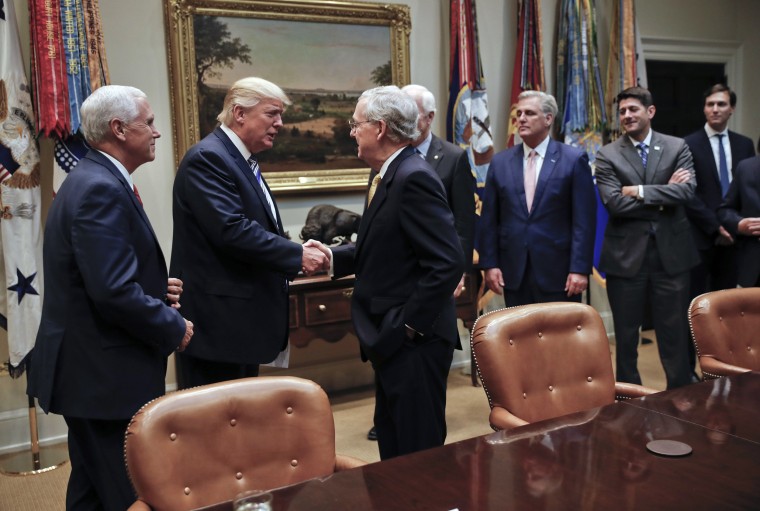WASHINGTON — President Donald Trump escalated his attacks against Senate Majority Leader Mitch McConnell Thursday, suggesting that the GOP leader should step aside if he doesn't pass any major pieces of legislation backed by the White House.
Blaming McConnell, Trump called the defeat of the health care bill by a single vote a "disgrace."
When asked if McConnell should step down from his leadership position, Trump told responded: "If he doesn’t get repeal and replace done and if he doesn’t get taxes done, meaning cuts and reform, and if he doesn’t get a very easy one to get done, infrastructure, if he doesn’t get them done, then you can ask me that question."
"Let's hope he gets it done," Trump added.
The comments came hours after Trump launched his third Twitter attack of the week against McConnell, feeding a pattern that threatens to deepen the distrust and frustration already bubbling within the traditional GOP establishment about a president who seems to have little concern for party loyalty.
The attacks from Trump continued even after a phone call Wednesday between the two leaders, an indication that the conversation didn’t serve to patch things up.
The public spat has thrust into the spotlight divisions that could threaten any potential success of the once-ambitious Republican legislative agenda. It could also damage the coherence of a party that has been in turmoil since Trump became the GOP presidential nominee in 2016 — but has mostly managed to present a united front.
"You can see the president’s tweets. Obviously, there’s some frustration. I don’t have anything more to add," White House Press Secretary Sarah Huckabee Sanders said Thursday.
Further complicating the relationship between the majority leader and the president is Elaine Chao, McConnell's wife who is serving as Trump's secretary of transportation.
"Elaine is doing very good job. I'm very disappointed in Mitch," Trump said.
Related: Trump's Spat with McConnell Widens GOP Divisions
Republicans' inability to pass health care has strained the party. McConnell fell one vote short on a seven-year-long campaign promise to repeal the Affordable Care Act, and Trump did little to advance the effort.
The president didn’t get personally involved until after the first attempt in the Senate was shelved and even then he spoke in platitudes, unable or unwilling to delve into the policy specifics necessary to woo skeptical Republican lawmakers. Ultimately, he was unable to change the minds of those skeptical senators.
For instance, McConnell's team had thought that Sen. Lisa Murkowski, R-Alaska, who was one of the three to vote against the final version of health care, was going to come around to support the bill, referred to as a "skinny repeal." But after Interior Secretary Ryan Zinke reportedly threatened to withhold resources from Alaska, Murkowski’s opposition hardened.
Since the health care bill’s failure, McConnell has indicated publicly that the president doesn’t fully understand the complexities of legislating, especially in a body where Republican senators represent politically diverse states.
Responding to Trump’s insistence last week that Republicans change the Senate rules to allow legislation to pass with just 51 votes instead of 60, McConnell pushed back, saying, "It’s pretty obvious that our problem on health care was not the Democrats. We didn’t have 50 Republicans."
But it was McConnell’s most recent statement Monday that set off the latest feud. McConnell told a local rotary club in Kentucky that the inexperienced president had "excessive expectations" and that Trump could help the process by staying "on message."
Trump has since taken to Twitter to attack the majority leader, someone who should be his biggest ally in advancing the White House and GOP agenda.
The party, fresh from its health care failure, is now gearing up for a busy fall when Republicans hope to see some legislative accomplishments on issues that have been difficult to find agreement on under the best of circumstances. Such intra-party squabbling, especially between top leaders, could make it nearly impossible.
And the president can get nothing of substance done legislatively without Congress.
"It’s simply counterproductive," said Michael Steel, former spokesman to ex-Speaker of the House John Boehner, of Trump’s attacks of the majority leader. "There’s no substantial policy achievement that the president can do without the assistance and support of the Senate majority leader."
"This whole thing is absurd," said former House Speaker and Trump ally Newt Gingrich on Fox News. "I think the president can’t disassociate himself from this. He’s part of the leadership team. He’s not an observer sitting up in the stands. He’s on the field. It was a collective failure."
It’s not unusual for Congressional leaders to be frustrated with the president of their same party. Tensions between Senate Democratic Leader Harry Reid, House Democratic Leader Nancy Pelosi and President Barack Obama arose.
And a similar dynamic occurred between President George W. Bush and congressional Republicans. But what is different is the public nature of this dispute and that it’s occurring so early in the president’s first term.
McConnell and Trump couldn’t be more different. McConnell is a highly political, partisan and quiet tactician who mostly avoids the cameras and is deeply loyal to the Republican party. Trump is a political outsider who won the presidency despite frequent and loud opposition from within his own party.
And his early tenure suggests that turmoil within the party will continue into next year's midterm elections.
A pro-Trump super PAC threatened to run adds against Nevada Sen. Dean Heller, one of the wavering Republicans senators during the health care debate. And one of Trump's top donors has contributed $300,000 to Kelli Ward — a primary opponent of Arizona Senator Jeff Flake, who already faces a potentially difficult re-election race and has been an outspoken Republican critic of the president.
Republicans are coming to McConnell's defense. The longest serving Republican senator, Sen. Orrin Hatch, R-Utah, who was one of the first senators to come out in support of Trump during the campaign, called McConnell "the best leader we’ve had in my time in the Senate."


